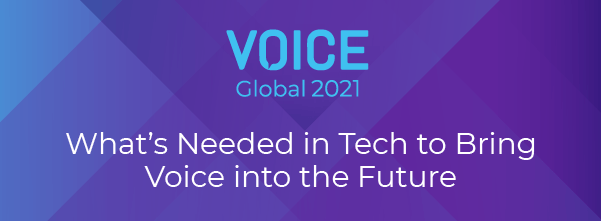What's Needed in Tech to Bring Voice into the Future?
VOICE Global 21-06-30 Modev Staff Writers 2 min read

Voice tech may be everywhere, from your phone to your speakers to your car. While that may be true, we're still in the early days of voice development. But what is the future of voice tech? Specifically, what technological capabilities do we need to unlock the creative potential of voice and make it a ubiquitous part of our everyday lives?
Roger Kibbe, Sr Technical Evangelist for Samsung, and voice development and architecture gurus and co-hosts of the Two Voice Devs podcast, Mark Tucker and Allen Firstenberg, joined us at VOICE Global 2021 to discuss the future of voice tech. The conversation provides insight into the key technological advances that are necessary to bring voice to the next level.
"The voice world is a magical place, and many, many amazing things have been built. But there are huge opportunities to build better and more immersive voice experiences," Kibbe tells us.
Tools of the trade
To fulfill those opportunities, Firstenberg is betting on more comprehensive voice developer tools. Drawing upon an analogy with web development, he tells us that web developers would edit HTML in text editors in the early days because more sophisticated tools didn't exist yet. People kept talking about the potential of web development, but it wasn't until tools like Dreamweaver became available that that potential could be realized.
"What we really need when it comes to voice development are tools like voice specific content management systems or the real ways that we can edit, not just the broad text to speech systems, but really be able to edit the audio nuances of what we want to reply with, how we want it to sound. And once we start getting those tools and putting them in the hands of people who are not developers, then I think we're going to start getting to where audio and voice become really, really powerful," he tells us.
Flow factory
For his part, Tucker provides more detail on the kind of functionality voice development tools should offer. He would like to see libraries of reusable components (such as skills and actions) that a voice developer could plug in rather than code each one manually. Such libraries would make voice development easier and more customizable and would go a long way in enabling more innovation and disruption in the voice tech space.
"As a voice developer, I need to think about so many different flows, like sending a text message from a voice app or filling in some questionnaire. There are just so many different things that you can do with voice tech. But if you could wrap those flows into components and provide a library of reusable components, that would be really helpful. So then as a developer, I wouldn't need to hand-code every conversation flow, and would also have the ability to plug in customized experiences that designers give to us to implement," says Tucker.
View the full interview to get all of the insights this triumvirate of technology voice leadership provides.
Missed VOICE Global live? Watch Roger Kribbe, Mark Tucker, and Allen Firstenberg discuss the future of voice tech and what's needed to get there on-demand here. View the VOICE Global speaker lineup to see what other engaging speakers joined us across various industries.